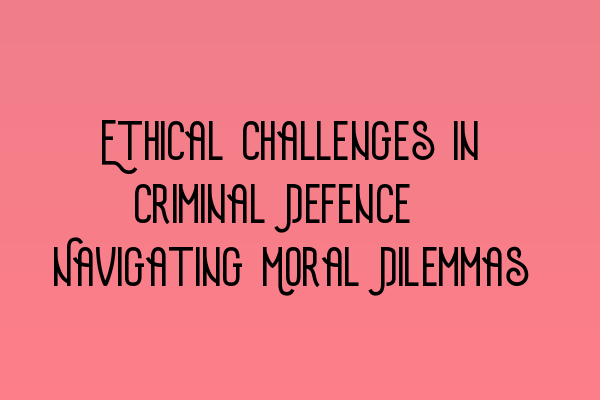Ethical Challenges in Criminal Defence: Navigating Moral Dilemmas
Being a criminal defence lawyer is not just a job; it is a profession that demands a high level of ethical standards and integrity. In the realm of criminal law, the role of a defence lawyer is to provide legal representation to individuals who are charged with criminal offences. However, in fulfilling this responsibility, defence lawyers often find themselves facing ethical challenges and moral dilemmas.
In this article, we will explore some of the ethical challenges that criminal defence lawyers encounter and discuss strategies for navigating these moral dilemmas.
The Duty to Zealously Represent Clients
One of the fundamental ethical obligations of a criminal defence lawyer is to zealously represent their clients. This duty requires defence lawyers to advocate for their clients’ rights and interests to the best of their abilities. However, this obligation can sometimes clash with the lawyer’s personal beliefs or moral values.
For example, a defence lawyer may firmly believe that their client is guilty of the crime they are accused of committing. In such cases, the lawyer may face a moral dilemma of representing a client they believe is guilty. However, it is important for defence lawyers to remember that their role is not to judge their clients but to ensure they receive a fair trial and legal representation.
Addressing this ethical challenge requires defence lawyers to compartmentalize their personal beliefs and focus on their duty to provide effective legal representation.
Confidentiality and Privilege
Confidentiality and attorney-client privilege are cornerstones of the lawyer-client relationship. Defence lawyers must maintain the confidentiality of their clients’ information and communications. However, in some situations, lawyers may face ethical dilemmas regarding confidentiality.
For instance, if a client discloses their intention to commit a future crime or harm others, the defence lawyer may face the ethical dilemma of whether to breach confidentiality to prevent potential harm. In such cases, lawyers must carefully consider their ethical obligations and potentially seek guidance from legal and professional bodies.
It is crucial for defence lawyers to strike a balance between protecting their clients’ interests and fulfilling their obligations to society.
The Role of Truth and Honesty
Defence lawyers are bound by ethical rules that require them to be truthful and honest in their interactions with the court and other parties involved in the case. However, the duty to advocate for their clients’ interests sometimes creates ethical challenges when facts or evidence suggest their client’s guilt.
Sometimes, defence lawyers may find themselves questioning whether to present certain evidence or arguments that could potentially mislead the court or other parties. It is in such situations that the lawyer’s ethical duty to the justice system and their clients may collide.
Navigating this ethical challenge requires defence lawyers to approach their role with utmost integrity and honesty. They must present the best possible defence within the bounds of ethical conduct, ensuring that their actions do not undermine the integrity of the justice system.
Conclusion
As criminal defence lawyers, navigating ethical challenges and moral dilemmas is an inherent part of the profession. Upholding the principles of justice, fairness, and integrity is crucial in providing effective representation to clients while maintaining the respect and trust of the legal system.
If you are interested in learning more about legal representation, ethical business practices, or the UK criminal law system, be sure to check out our related articles:
- Legal Representation for Delaware LLCs in the UK: Expert Advice
- Ensuring Ethical Business Practices: Delaware’s Code of Conduct
- Legal Challenges for UK Businesses in the U.S.: Strategies for Overcoming Hurdles
- UK Criminal Law: An In-Depth Analysis of the British Legal System
- Legal Challenges for UK Businesses in the U.S.: Strategies for Overcoming Hurdles
